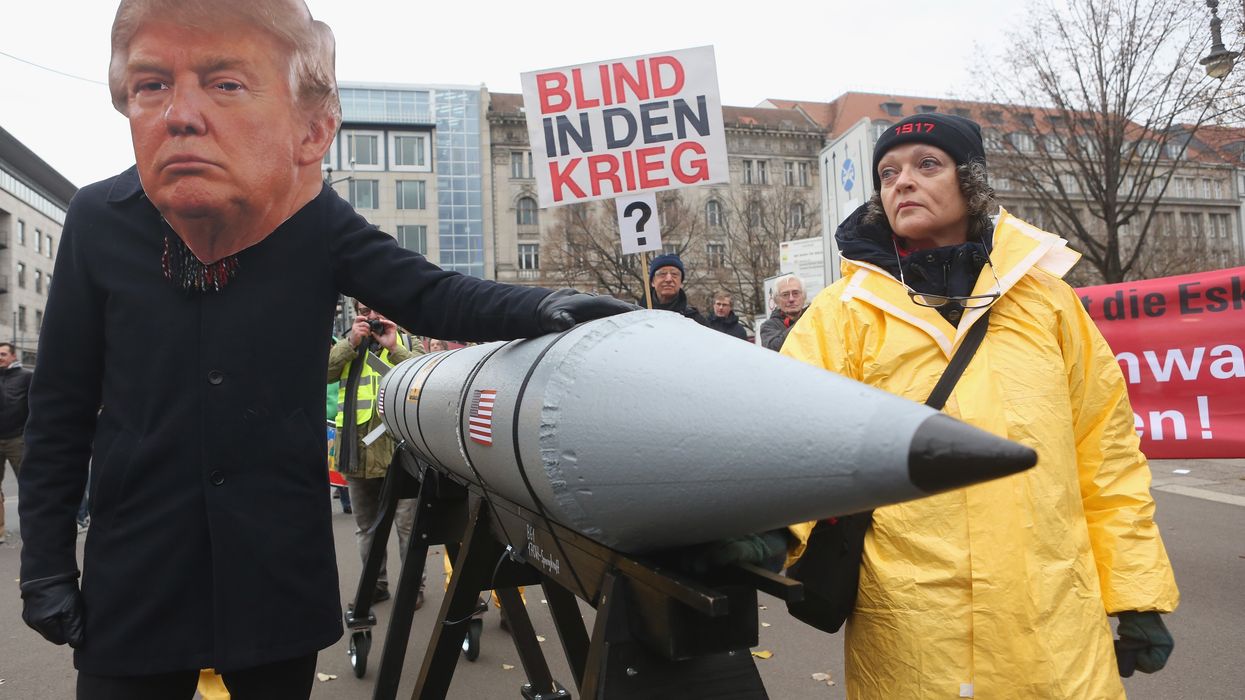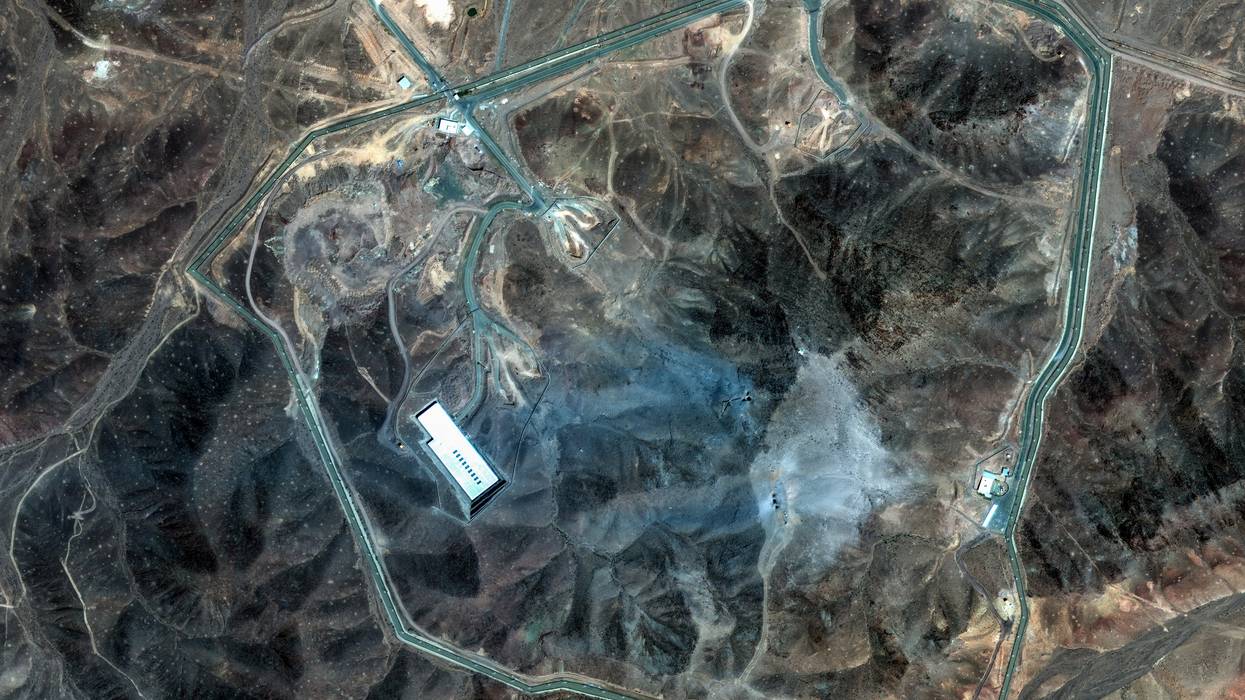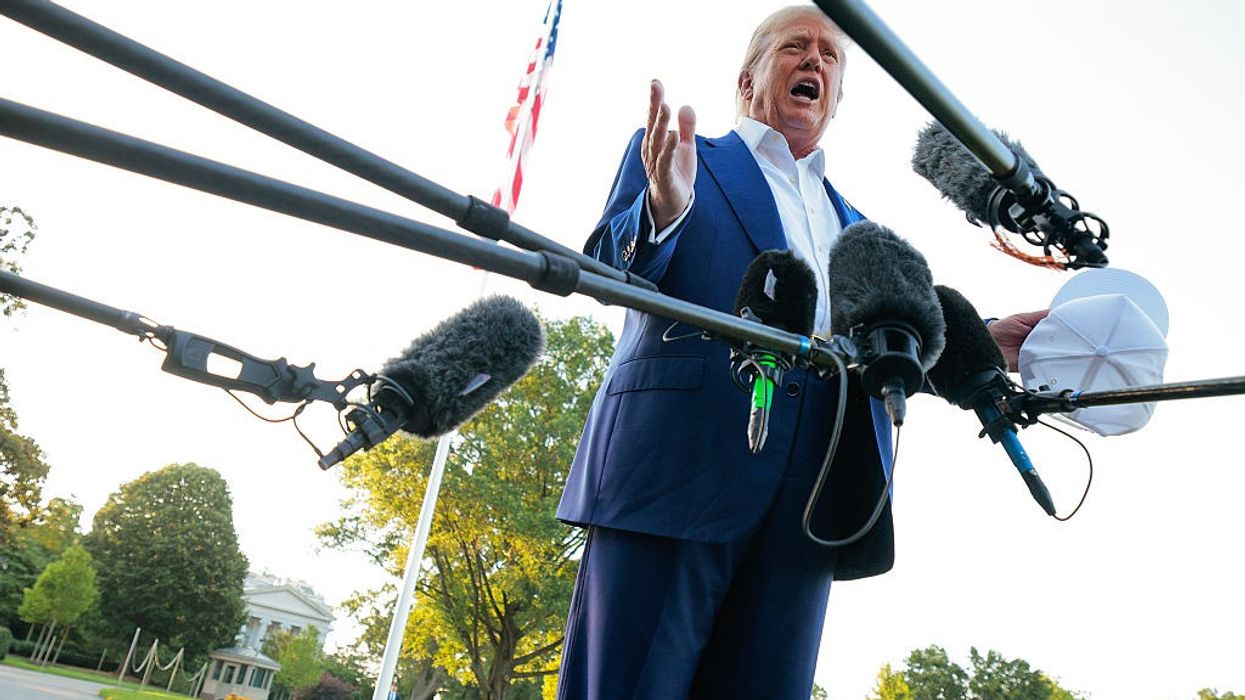This piece examines the unfolding dynamics of the crisis, analyzes potential trajectories, and evaluates the broader implications for national sovereignty and global security in an increasingly fragmented world order marked by legal erosion, intensified conflict, and competing hegemonies.
Crisis as Strategy: Manufacturing Conflict in the Shadow of Decline
On June 22, 2025, the U.S. intervened in the Iran-Israel war by attacking Iran, through an operation dubbed "Operation Midnight Hammer," which involved the deployment of B-2 stealth bombers armed with GBU-57 bunker-buster bombs. It targeted sites previously thought impenetrable and marks the first time Washington has taken direct military action against Iran's nuclear infrastructure. American officials frame it as a limited, preventive measure designed to halt Iran's nuclear progress, signaling that no further strikes are currently planned. Yet such rhetoric must be critically evaluated. The scale and precision of the bombings, along with U.S. President Donald Trump's ambiguous "Make Iran Great Again" statement, raise suspicions about the administration's longer-term goals, including the possibility of engineered "regime change" by nontraditional means, escalating tensions, draining resources, and exploiting internal fractures.
What began as a regional confrontation has been instrumentalized into a global warning: a demonstration of force aimed at deterring the momentum of multipolar alternatives.
Iran's initial response has been carefully calibrated. Shortly after vowing retaliation, Tehran launched a limited missile strike on a U.S. military base in Qatar, likely coordinated in advance with Qatari and possibly even American authorities to minimize casualties. This symbolic yet pointed action appears designed to send a strategic message: Iran will respond, but not recklessly. The move suggests a preference for controlled escalation, signaling strength while leaving space for deescalation. Other retaliatory options remain on the table: cyber-attacks on U.S. infrastructure, disruption of maritime traffic in the Strait of Hormuz, withdrawal from the Nuclear Non-Proliferation Treaty (NPT), or asymmetrical operations via allies such as Hezbollah, the Houthis, or Hashd al-Shaabi. Each carries serious risks for Iran, the region, and global stability. Tehran's leadership seems intent on avoiding the U.S.' trap of full-scale escalation while assessing the fallout, recalibrating strategy, and consulting closely with allies like Russia and China to secure diplomatic backing and military preparedness. The U.S. response to this measured strike will shape the next phase of confrontation.
The Possible Scenarios Ahead
In the wake of the U.S. military strikes on Iran's key nuclear and military facilities, and the intensified hostilities between Iran and Israel, four major strategic trajectories now seem plausible. Each hinges on complex interactions between military calculations, geopolitical alignments, and domestic constraints. These are not mutually exclusive and may bleed into one another depending on evolving events.
Scenario A: Intensified but Contained Confrontation
This scenario envisions a continuation of calibrated escalation; Israel, backed by the United States, continues precision strikes on Iranian military and nuclear infrastructure, while Iran retaliates through means carefully modulated to avoid triggering direct U.S. engagement. Proxy confrontations across Iraq and the Red Sea may intensify, but red lines may be respected regarding attacks on American personnel or sovereign territory.
The strategic aim on all sides is to inflict sufficient costs to assert deterrence and save face, without tumbling into full-scale war. Israel preserves its posture as the self-designated regional enforcer, the U.S. projects its global policing role without deep involvement, and Iran upholds its position as a sovereign actor refusing to be subjugated. This scenario is already in motion.
Its durability, however, depends on multiple pressure points: the endurance of Iran's infrastructure and internal cohesion; Israel's appetite for military risk, enduring the already growingly backbreaking economic costs of the conflict and decreasing political gain; the U.S. election and economic calculus; and the reaction of regional and global powers. As weapon stockpiles diminish and war fatigue grows, the possibility of shifting into another scenario becomes more likely.
Scenario B: Direct Iran-U.S. Military Confrontation
This high-stakes scenario envisions a significant escalation whereby Iran targets U.S. military assets (such as bases in Iraq, Syria, Qatar, or Bahrain) or naval forces in the Persian Gulf. Any such action would almost certainly provoke a forceful U.S. military response, including sustained air and naval operations, with the potential to spiral into a broader regional war.
The recent limited Iranian missile strike on the U.S. base in Qatar, reportedly carried out with prior warnings to local and possibly American authorities, suggests that Tehran is testing this boundary carefully. It was likely intended as a symbolic gesture (assertive yet calculated to avoid immediate escalation), demonstrating Iran's capability while keeping the door open for deescalation.
The U.S. strikes on Iranian nuclear and military facilities, despite Iran's continued NPT compliance, have shattered the perceived legitimacy of the global security architecture.
Despite this, the broader risk of uncontrolled escalation remains. Miscalculations, false-flag provocations, or misunderstood retaliatory acts could still trigger a more direct and sustained confrontation. A scenario where Iran disrupts the Strait of Hormuz or targets high-value U.S. assets without prior signaling would heighten the risk of full-scale conflict.
Strategically, this path remains the most perilous for Iran. A direct war would stretch its already burdened military apparatus, require multi-front engagement, and risk massive infrastructural and civilian losses. For this reason, both Iran and the U.S. appear reluctant to pursue it, but it cannot be ruled out. Should this scenario unfold, it may quickly slide into Scenario C: a prolonged war of attrition aimed not at conquest but at systemic destabilization and regime fatigue.
Scenario C: Shock Doctrine and "Soft Regime Change"
This scenario imagines a prolonged campaign of attritional warfare (military strikes, economic destabilization, disinformation, and psychological operations) aimed at gradually eroding the legitimacy and capacity of the Iranian state without formal invasion. The goal here is not decisive battlefield victory but strategic disintegration.
This would involve more calculated acts of destruction (such as the recent strikes on Natanz, Isfahan, and Fordow), imposition of even harsher sanctions via mechanisms like the Joint Comprehensive Plan of Action (JCPOA) snapback, and deliberate amplification of dissent within Iran. Western powers and Israeli intelligence would continue cultivating fractures within the Iranian elite and broader society, particularly among the disillusioned middle class and peripheral ethnic communities.
However, this is a dangerous gamble. Iran's memory of the 1953 coup and decades of resistance to imperial interventions has hardened its political institutions. The state has adapted to high-pressure conditions through robust security apparatuses, ideological cohesion, and crisis-driven legitimacy. Large sections of the Iranian public, despite the internal divisions, tend to consolidate around national sovereignty during times of external threat. Thus, while slow erosion remains a strategic goal for some in the West, the plan may backfire, further entrenching authoritarian reflexes and exacerbating regional volatility.
Scenario D: Exhaustion, Tactical Deescalation, and Renewed Covert Warfare
This scenario becomes increasingly plausible if the cumulative costs of confrontation (military, economic, and political) begin to outweigh perceived strategic gains for both Iran and Israel. For the United States, a prolonged regional conflict also carries serious geopolitical risks. While Washington becomes further entangled in a high-stakes escalation with no clear exit strategy, Beijing quietly consolidates its economic recovery and enhances its military capacity. The longer the U.S. remains embroiled in Middle Eastern entanglements, the more it risks losing strategic ground in its broader rivalry with China.
Within this context, signs of weapons fatigue, infrastructure degradation, and growing global disapproval could push the belligerents toward tactical deescalation. Iran, aware of the long-term humanitarian costs and the strategic risks of total war, may choose to delay or modulate its retaliation to maintain room for maneuver. Israel, facing mounting international criticism and potential strain on its domestic cohesion, may similarly reduce the intensity of its military operations. However, such restraint would likely represent a pause rather than peace, a recalibration rather than a sustainable resolution.
Such a pause would be fragile and conditional. It would not represent peace but rather a shift back from overt to covert conflict. Iran may strengthen its nuclear policy by shifting further into opacity, denying or limiting International Atomic Energy Agency access, decentralizing enrichment activities, and tightening information control. Western powers would find it easier to interpret this as nuclear escalation and would more decisively push for the reactivation of the JCPOA snapback mechanism that will lead to new layers of global sanctions. Internally, Iran would enter a phase of intensified securitization, i.e., greater surveillance, suppression of dissent, and policing of civil society. Externally, Israel and Western intelligence agencies would likely continue to support dissident networks, cyber operations, and economic sabotage.
Key Factors Determining the Next Phase
1. The Role of Great Powers
Russia and China have condemned Israel's unprovoked aggression and the recent U.S. strikes. Both countries have critical stakes in Iran: China relies on it for energy security and Belt and Road transit; Russia views it as a strategic partner in countering Western hegemony. While neither country seeks war, they may offer Iran advanced air defense systems, intelligence sharing, and diplomatic cover. Reports of Chinese cargo flights into Iran hint at a subtle but increasing strategic alignment.
2. Geoeconomic Implications
Oil prices surged after the strikes, with Brent crude nearing $75-80 per barrel. Financial markets responded with caution, as investors fear extended volatility. Inflationary pressures have intensified in Europe and Asia, driven by rising energy costs. Central banks in the West may now hesitate to cut interest rates, fearful of stagflation. This economic pressure acts as both a constraint on war and a bargaining chip: All actors now operate in a context where geopolitical decisions carry immediate economic costs.
3. Public Opinion
Trump's decision to strike Iranian facilities is a high-stakes gamble. It appeals to Republican hawks who view it as a show of strength, but most Americans remain wary of another Middle East entanglement. With public memory still shaped by Iraq and Afghanistan, Trump must appear decisive without triggering fears of endless war. His framing of the attack as "surgical" and "defensive" may hold for now. But a single U.S. casualty, oil price spike, or market shock could swiftly erode support, turning the move into a political liability in an already polarized election cycle.
4. Iran's Structural Resilience
Despite years of economic sanctions, internal unrest, and now direct military assaults, Iran's political structure has not fractured. The IRGC, Basij, and Artesh continue to demonstrate institutional cohesion and loyalty. While widespread discontent persists, no unified or credible opposition force has yet emerged with the capacity to rally the population against the state. The historical memory of foreign interventions still serves as a potent source of nationalist resilience. Many external analysts underestimate Iran's ability to endure crises, overlooking its layered, pluralistic, and historically adaptive modes of governance. However, the most serious threat to Iran's resilience may come not from external aggression but from within: decades of neoliberal structural adjustment have hollowed out public services, deepened inequality, and eroded economic sovereignty. By binding the national economy to global market fluctuations and dollar-based trade systems, these reforms have made Iran acutely vulnerable to inflationary shocks and currency instability. Above all, they have rendered international sanctions far more effective, magnifying their impact on everyday life and intensifying mass dissatisfaction. The current government continues to adhere to an economic model that prioritizes fiscal orthodoxy over redistribution or self-sufficiency. This approach is fundamentally ill-suited to the demands of wartime mobilization. It places the burden of conflict squarely on working people and makes the economic pressures of protracted confrontation increasingly unbearable.
Implications of the Crisis for Security and Sovereignty Beyond Empire
From a critical scholar-activist perspective, the current escalation must be seen as part of a broader strategy by a declining global hegemon to reassert authority over an increasingly fractured world order. Confronted with deep internal crises and the erosion of its unipolar dominance, the United States has exploited the Iranian nuclear issue, first by pressuring Iran into fruitless negotiations, then enabling its regional proxy, Israel, to manufacture escalation, ultimately militarizing the conflict as a calculated strategy to reassert geopolitical discipline. What began as a regional confrontation has been instrumentalized into a global warning: a demonstration of force aimed at deterring the momentum of multipolar alternatives, particularly the rising influence of China, the BRICS bloc, and other emergent alliances challenging Western supremacy.
Through this confrontation, Washington seeks to reassert the primacy of its security architecture and dollar-based economic order, even at the cost of further destabilizing international norms. Military action under the banners of "non-proliferation," "defense," or "regional stability" masks a deeper agenda: disciplining dissenting states, undermining autonomous alliances, disrupting China's Belt and Road Initiative, and reminding the Global South that any deviation from the unipolar script will be met with force. Yet this strategy is paradoxical; while aiming to halt decline, it simultaneously deepens the crisis of legitimacy facing global institutions, erodes faith in international law, and accelerates the very multipolar shifts it seeks to suppress.
This is not a time to restore a failed status quo. What's needed is a radical rethinking of security, sovereignty, and development, beyond the coercive logic of militarized capitalism.
The core issue is not whether Iran is building a nuclear bomb (there is no credible evidence that it is) but whether sovereign states are permitted to pursue energy independence, chart autonomous foreign policies, or forge alternative economic alliances. The strikes make clear that even legal adherence to international treaties offers no shield against coercion when a state resists the dominant script. What is being punished is not a violation of norms, but defiance of empire. And yet, resistance (both armed and diplomatic) endures.
The stakes are extraordinarily high. One misstep could ignite full-scale regional war, disrupt global energy markets, and deepen economic inequality. Yet beneath the immediate crisis, the U.S. strikes on Iranian nuclear and military facilities, despite Iran's continued NPT compliance, have shattered the perceived legitimacy of the global security architecture. The NPT's foundational bargain (non-nuclear states forgo weapons in exchange for peaceful technology and protection) has been exposed as hollow. Compliance has not shielded Iran from unilateral aggression, eroding faith in international law.
Amid this breakdown, new possibilities are emerging. Multipolar diplomacy, South-South cooperation, and grassroots transnational solidarity are rising as alternatives in a world long denied inclusive governance. This is not a time to restore a failed status quo. What's needed is a radical rethinking of security, sovereignty, and development, beyond the coercive logic of militarized capitalism. Whether we spiral into catastrophe or move toward a more just world depends on the courage and imagination of those who still believe another future is possible.



